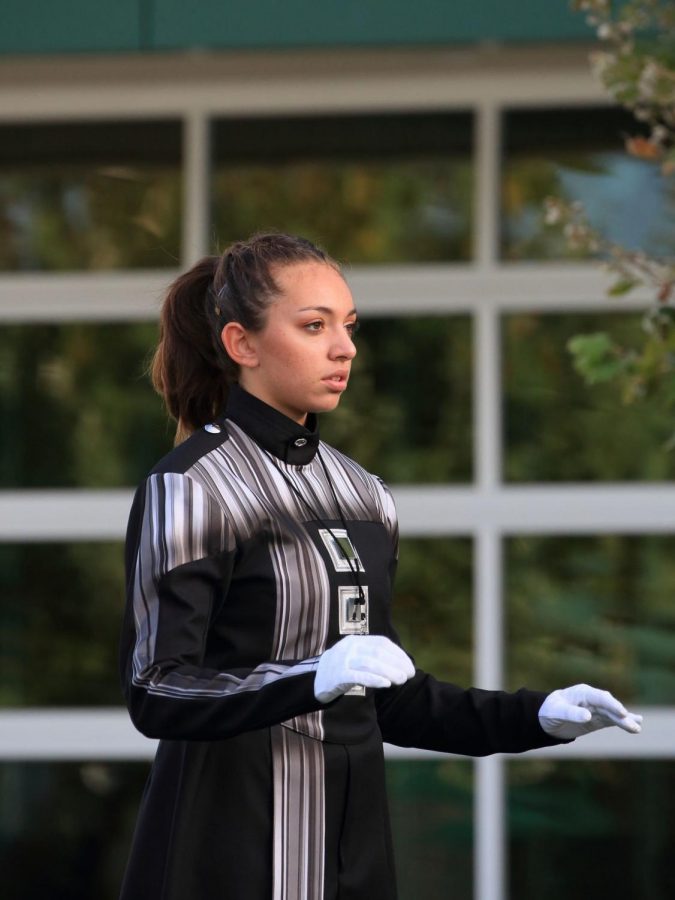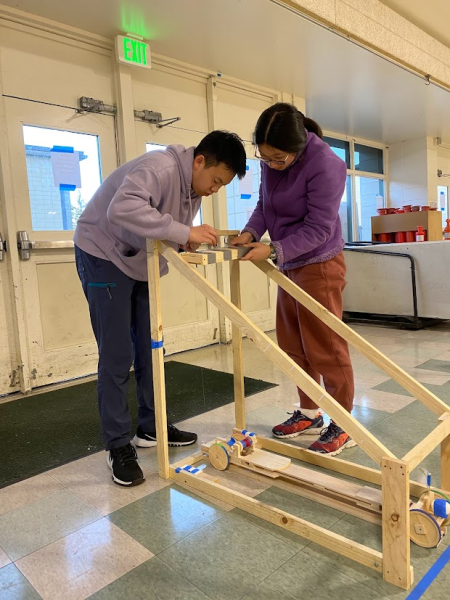Drum major Shani Zuniga doesn’t only conduct
“I
t’s a lot more than just waving your arms, which is what a lot of people think it is.”
From clarinetist to drum major to head student leader of the marching band, senior Shani Zuniga has gone through many musical transitions that she can’t help but grin and gush about with passion.
Zuniga has been a part of school band programs since fourth grade, playing the clarinet up until her freshman year, Zuniga said.
“Going into my sophomore year, I auditioned to be a drum major and I got assistant drum major which is back field drum major,” Zuniga said. “And then my junior year I was a co-head drum major, and this year I am the head drum major.”
Leading up to drum major auditions, Zuniga had to attend multiple workshops led by the year’s previous drum major team before attending the audition and interview. This was crucial in landing a drum major position for herself, Zuniga said.
“My freshman year, I really idolized the drum majors,” Zuniga said. “Now that I think back on it, maybe it was a little too much.”
After being encouraged by her drum majors to audition, Zuniga said she was taken aback by the support she received when she was merely a freshman. While sophomores do not usually get a drum major position, Zuniga said she believes character is the most important deciding factor.
“[Being a drum major] was hard first because all of the upperclassmen didn’t respect me that much because I was younger,” Zuniga said, “and it was hard to listen to someone who is two years younger than you.”
Although she is a drum major for marching band, Zuniga still plays her clarinet during concert band, after marching season is over. However, she misses marching more than playing her instrument, Zuniga said.
“When you march on the field, you get this feeling of being a part of something that’s both emotional, and mentally, but also when you’re physically on the field performing, it’s a really magical feeling,” Zuniga said.
There is a big misconception that being a drum major is simple, when realistically, being a leader adds heightened pressure with increased responsibility, Zuniga said.
“We have to get the poles out to measure out where the tape goes, we have to get our podiums out, we have to make sure the bathroom are unlocked, we have to make sure we’re in the right place and we’re ready to go… a lot of the nitty gritty stuff that you don’t think about when you think of marching band is run by the drum majors,” Zuniga said.
Drum majors are also responsible for bridging the gap between staff and student, Zuniga said, to ensure both parties know what the other needs.
“There’s a lot of people telling us a lot of different things and you have to figure out what you gotta say and what you can’t say,” Zuniga said. “It can be a lot of pressure behind conducting and keeping time.”
Communication is a key skill to maintain when leading a large group of people, Zuniga said.
“You have to make sure everyone knows that you care about them but also be able to talk in a more professional level with the staff,” she said.
Zuniga said another important characteristic to acquire as a drum major is confidence.
“It’s really hard to have confidence in yourself sometimes when you don’t know what you’re doing…” Zuniga said, “so sometimes I’ll have to pretend like I know what I’m doing, and fake it ‘til I make it.”
Zuniga said she has gained a plethora of skills from the struggles she has endured, but the memories and relationships made has made it all worthwhile.
“The fact that I’m able to experience a lot of [these moments] now is going to save me a lot of pain in the future,” Zuniga said, “a lot of hassle, a lot of stress and I know I’m going to take a lot of my experiences with me.”








